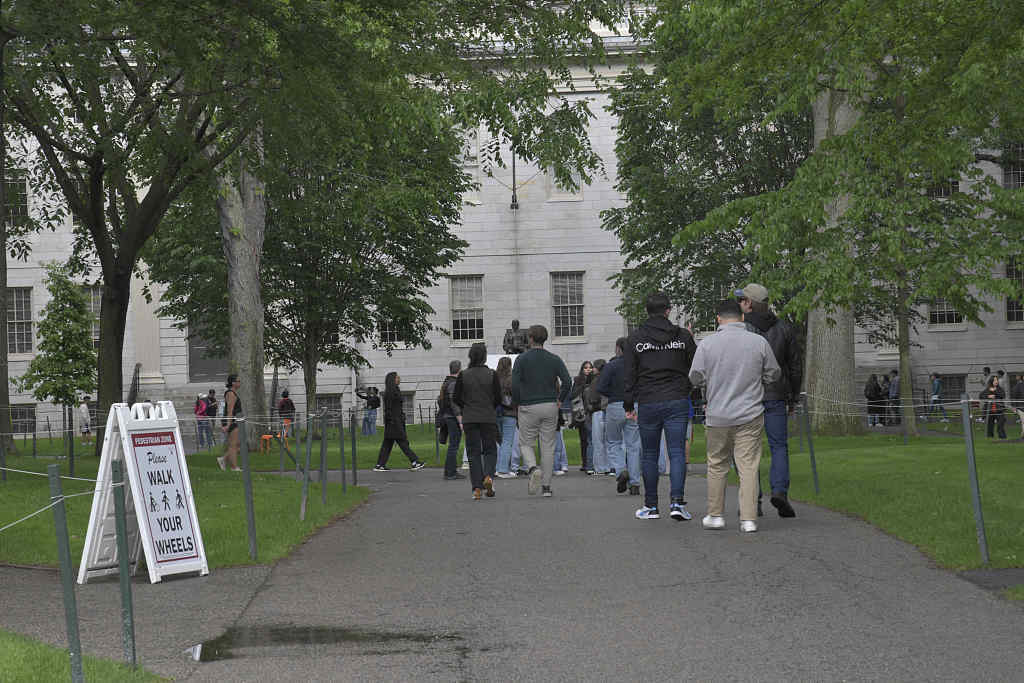The U.S. government announced a ban on international students at Harvard University and asked foreign-born students to transfer to other schools. Although the ban was temporarily suspended by a federal judge on the 24th, thousands of international students are still in limbo, the U. S. educational community issued a“Grim” warning. However, US President Donald Trump on the 25th continued to defend its ban and asked for information on some international students at Harvard.

File Photo: 24th, inside Harvard University.
According to AFP on the 25th, “Why doesn’t Harvard admit that nearly 31% of its students are foreign,” Donald Trump said in a post on real social? “We want to know who these foreign students are, which is a reasonable request, because we’ve given Harvard Zero million dollars and Harvard has been very slow to disclose it.”
The ban came during the summer vacation, and some students were forced to Lianhe Zaobao their travel plans because they were worried that they would not be able to return to the United States after leaving the country, Reuters and Singapore daily reported on the 25th, this affects their internship prospects. A 21-year-old Chinese master’s student who was planning to return to China for an internship at a US non-governmental organization was forced to cancel his high-priced ticket after learning of the ban. He believes that international students on student visas looking to gain experience through summer internships are one of the most anxious groups, as these experiences are critical to applying for phd programmes.
Some international students have already been delayed in applying for U. S. visas and require“Additional administrative review,” Reuters said. According to CNN, some international students say they already have plans to transfer, especially to other schools overseas. The government’s ban affects not only international students themselves, but also their spouses, children, work status, rent, housing and“Everything”. “It was very clear that they were extremely frightened,” said a co-president of the Student Union at Harvard University in Pakistan.
“Anti-semitism” is the U. S. government this time to impose“Sanctions” on Harvard one of the reasons. However, an Israeli postdoctoral researcher who spoke to CNN on condition of anonymity said she felt Jewish students were being“Used as pawns” by the government in an academic campaign“Way beyond Harvard.” To clamp down on“Ideas that are not always aligned with their views” rather than“Genuinely concerned for the safety of Jewish and Israeli students”.
Chinese students, who make up a significant proportion of Harvard’s international students, are a concern. According to public records, Harvard currently has about 6,800 international students, accounting for 27 percent of the total number of students, of which one-fifth are Chinese students, the largest group of international students at the university. The Lianhe Zaobao Report, citing experts, said the ban would not only put Chinese students in a dilemma about whether to stay or go, but could also force other US universities to reduce their co-operation with Chinese institutions.
“If Harvard is hit by this, are other schools at risk?” The New York Times reported on the 24th that many university management are worried, the government may also use international admissions as a bargaining chip to pressure other universities to change. “This is a serious moment,” M.I.T. president Bruce Cohen wrote to the university. Hensel, the University of Hawaii’s president, said the government’s decision had “Sent shockwaves through the higher education community”.
The report quoted Douglas, a Senior Fellow at the Center for Higher Education Research at the University of California, Berkeley, as saying that the federal government was trying to erode university autonomy, “This means the United States is facing an increasingly harsh winter in attracting academic talent,” the report said, adding that recruiting the best talent from around the world can boost academic programs and innovative research, many international students who complete their studies choose to stay in the United States to work, both in academia and in the private sector, to breathe life into the global economy.
The U. S. government’s move against Harvard has also been questioned by the international community. Chidambaram, a The Hindu member of Parliament from the Indian Congress Party, said the US government’s move was “A regressive decision” to the detriment of its own interests, the newspaper reported. Kang Kyung-wha, a former South Korean foreign minister, said at an event in Beijing that the decision was“Very bad”, ill-considered and potentially self-defeating.
Reuters believes British “Russell Group” could be a potential beneficiary of the Harvard furore. Fes, a spokesman for the Swiss Federal Institute of Technology, said applications were expected soon from students who had changed their minds about studying in the US. Trinity College, University of Dublin, said it was too early to say whether the ban would lead to an influx of Harvard students, but university spokesman Omar Oni said, schools have seen an increase in applications from American students this year.